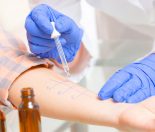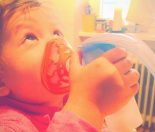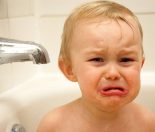Want to know more about what is eczema? Looking for tips on how to help your child if they may be prone to eczema? This article gives you some great information on the types of eczema, as well as the signs, symptoms and treatment for eczema that are available.
What is atopic dermatitis?
Atopic dermatitis is more commonly known as eczema. Eczema is a condition which causes inflammation of the skin. This results in redness, swelling and itchiness. It’s a chronic condition, which means it may last for a short time or in some cases it can be an ongoing condition, lasting many years.
There are 3 types of eczema
- Infantile eczema usually begins before 6 months and can continue until 5 years of age.
- Childhood eczema may continue on from infantile eczema, or may start at 2-4 years, continuing through primary school.
- Adult eczema which usually resolves in middle to old age.
Children with eczema often have other allergic disorders, such as asthma and hay fever. They often have a family history of reacting to factors in the environment, such as dust, pets, pollen and chemicals. Eczema is very common; it affects 1 in 5 people at some point in their lifetime.
What are the signs and symptoms of eczema?
The symptoms of eczema are very mild in some children (possibly a bit of redness on the skin behind the ears) and severe in other children (affecting their entire body and their whole family’s way of life).
- Infantile eczema presents as a red rash (which may weep) and heavy scaling on the skin
- Childhood eczema presents as a rash on the face, neck and typically in the skin folds of joints, such as knees and elbows.
- In adult eczema there are areas of red itchy skin, which may weep. Again it is common in elbow and knees, as well as other areas such as the neck and wrists.
What is the treatment for eczema?
Eczema is often managed by the family, with support from GPs and Specialist Dermatologists, when necessary.
- Steroid creams may be prescribed, using the lowest dose possible.
- Antihistamines may be used – some are sedating, which are suitable for night time only.
- Weeping, oozing and crusting may suggest the presence of secondary infection, which may need treating with antibiotics.
- Many natural health therapies (e.g. reflexology and homeopathy) offer help and support in controlling asthma.
Risks and complications of eczema
The main risk is aggravating the eczema with a skin infection, which in turn becomes difficult to heal. Cold sores and chicken pox should be avoided wherever possible.
What can I do to help my child with eczema?
- Identify triggers – things that aggravate your child’s eczema- then try to minimise their contact with them (eg. cigarette smoke, pollen, dust)
- If the eczema is allergy related, then certain foods may need to be eliminated from the child’s diet – the most common are eggs, fish, peanuts, milk and soy.
- In infantile eczema, breastfeeding mothers may need to eliminate foods such as eggs or cow’s milk.
- Breastfeeding your children for as long as possible – at least 6 months exclusive feeding – can help if you have a family history of allergies.
- Dress your child in loose cotton clothing, avoiding seams or elastic over the areas of skin that are particularly prone to inflammation.
- Bathe regularly, every day or other day, but avoid hot baths and showers, and keep the bath to less than 10 minutes.
- Avoid soap and bubble bath, try soap substitutes and moisturisers, which can be recommended by your pharmacist / natural therapist.
- Lubricate the skin liberally with an Eczema-approved moisturiser, within a few minutes after bathing, to lock in the moisture on the skin.
- Try to prevent scratching – cotton mittens or socks worn on the hands at night, oatmeal baths, antihistamines if necessary and keep nails short.
- Eczema can be worsened by stress – try calming, soothing measures to calm your child such as stories and warm baths.
- Allergy New Zealand have a fantastic Eczema Management Plan you can print off and work with your GP on.
Video courtesy: Kidshealth New Zealand
Now that you know what eczema is, we asked our Facebook community how to get rid of eczema, and over 100 Kiwi families responded. For information on how parents can help with eczema and other allergies you should check out our Common Allergies article. Or, for more expert health advice check out Health and wellbeing section.







Hi, mu daughter is 9yrs old and has very acute eczema especially on her face. If she is playing outside in school a lot and when she gets home her face weeps and is sore. Sometime she put ice cubes to soothe the weeping and makes it worse when she showers. The rest of her body is okay its just her face and scalp. Her scalp is dry and itchy The flakes on her scalp looks like dandruff.. i have tried everything kind of soap free organic shampoos but none does work. Any suggestions please.
Hi Sisilia, Some of our Facebook friends (104 of them!) wanted to share their ideas for helping your daughter’s eczema. You can find their comments here: https://www.facebook.com/kiwifamilies/posts/827342527324377 – All the best! Sally
Hi, we struggled with eczema with my 2 year old – we had tried everything but nothing worked! A friend of ours told us about this all natural herbal cream for eczema from this company Kamedis and the eczema honestly started clearing up straight away. Its called “TOPIC Medis” and I really recommend you try it! Their website is http://www.kamedis.co.nz
I use to buy Dr X soap from a store in Whangarei called Dirty Soap. This soap is magic on Eczema. Cheap too only $4 a bar lasts about 2 weeks.
My daughters pediatrician says she had contact dermitis. It began as a small patch on her abdomen, then after a day it spread all over her chest and right arm. Its been 1 mos and her chest cleared, but I now notice those same bumps on both her thighs. Does this sound normal as being contact dermitis?
I can’t figure out why my 3.5 year old son has suddenly got a lot of eczema on the back of his thighs – his diet hasn’t changed recently. Could it be purely a seasonal thing? I am off to the chemist soon to get some cream, we went to the beach this morning and he was not a happy boy with the salt on it!
Hi there, It may be that your son has eaten something that he is allergic/sensitve to and this has caused the excema, however I would expect it to be more widely spread or on his face rather than the backs of his legs. Have you recently changed washing powders or has he worn some new clothes that have yet to be washed after purchase? Also, it may be heat rash, this sometimes looks very similar to an excema rash and does present itself in the creases of limbs. Good luck with the creams from the pharmacy, also when heading out… Read more »
Thanks Kate, that’s super helpful advice (I had forgotten about paw paw cream, used that a lot when he was a baby).
I haven’t changed washing powders or put him in new clothes since it showed up (funnily enough, it seems quite a bit better since he was in the sea!) but I wonder if it might be heat rash.